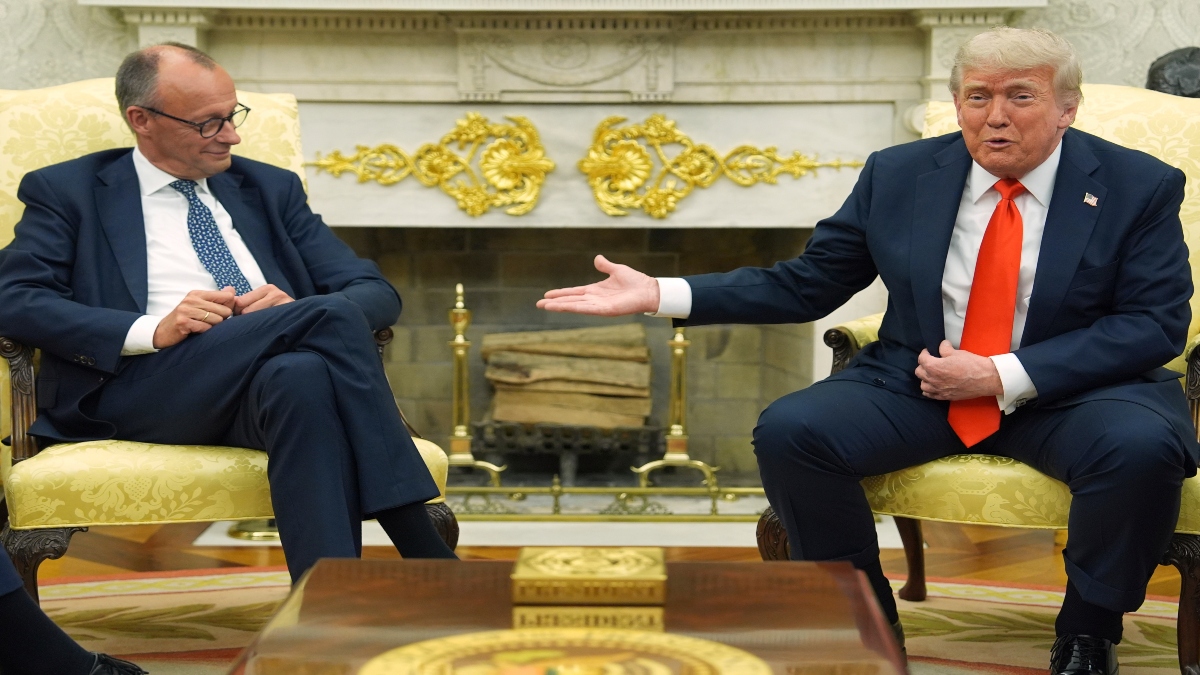German Chancellor Friedrich Merz on Thursday met President Donald Trump at the White House and called him the “key person” to bring about an end to the war in Ukraine “by putting pressure on Russia.”
“We both agree on this war and how terrible this war is going on, and we are both looking for ways to stop it very soon. And I told the president … he is the key person in the world who can really do that now by putting pressure on Russia,” CNN quoted Merz as saying.
The German leader reaffirmed his country’s unwavering support for Ukraine, stating that the horrific scenes from the battlefield are the result of “Russian weapons against Ukraine.”
“Ukraine is only targeting military targets, not civilians, not energy infrastructure. So this is the difference, and that’s the reason why we are trying to do more on Russia,” Merz added.
Earlier, Trump opened by congratulating Merz on his February election win, noting that the two often discussed “the problems of the world outside of Germany,” specifically mentioning Russia’s invasion of Ukraine.
“It’s not good. He’s unhappy about it. I’m unhappy about it, but I think eventually we’re going to be successful in stopping the bloodshed,” The Guardian quoted Trump as saying.
Impact Shorts
More ShortsMerz emerged from his Oval Office meeting with Trump largely unscathed on Thursday, despite clear differences over Ukraine — with the US president remarking it might be best to let Moscow and Kyiv “fight it out like children.”
Just a month into the job, Merz launched a charm offensive on the 78-year-old, gifting Trump a framed copy of his grandfather Frederick’s 1869 German birth certificate.
The polite meeting showed that the conservative German leader had done his homework as he sought to avoid ambushes like those that Trump unleashed on Ukraine’s President Volodymyr Zelensky and South Africa’s president.
But they did not see eye to eye on everything.
Let the two sides fight it out
Trump, who had spoken with Russian President Vladimir Putin just a day earlier, suggested it might be better to let Russia and Ukraine “fight it out,” likening the devastating war — which has claimed thousands of lives and ravaged large parts of Ukraine — to a squabble between children.
“Sometimes you see two young children fighting like crazy. They hate each other, and they’re fighting in a park, and you try and pull them apart,” AFP quoted Trump as telling reporters.
“Sometimes you’re better off letting them fight for a while,” he added.
Trump said he had cautioned Russian President Vladimir Putin against retaliating after Ukraine’s drone strikes on Russian airbases that destroyed several nuclear-capable bombers.
“I said ‘don’t do it,’” Trump told reporters, noting that Putin responded by saying he had no choice and that it was “not going to be pretty.”
During the remarks, Trump also made a string of off-color references to Nazi Germany’s defeat in World War II — a topic that remains highly sensitive in Germany today.
Commending Merz for boosting Germany’s defence spending in line with his long-standing Nato demands, Trump quipped that he wasn’t sure WWII US General Douglas MacArthur would have approved.
Then, referring to the upcoming 80th anniversary of the D-Day landings, Trump asked: “That was not a pleasant day for you?”
Merz, 69, responded calmly: “This was the liberation of my country from Nazi dictatorship. We know what we owe you.”
Tariffs deal possible
Merz avoided other possible pitfalls as Trump spent much of his time on a lengthy discourse against his billionaire former advisor Elon Musk.
Topics like US tariffs on the EU and the prospect of a trade deal barely came up, with Trump saying he believed a deal was possible.
On Trump’s threat to hammer the European Union with sharply higher tariffs, Merz, leader of the bloc’s biggest economy, had earlier argued that it must be self-confident in its negotiations with Washington.
Nor did Trump confront Merz over free speech issues in Germany as US media had reported he might - a bugbear the administration has repeatedly brought up with European leaders despite its own record.
Merz told reporters in Washington ahead of the meeting that if Trump brought up German domestic politics “I will state my opinion very clearly if necessary.”
Trump and some in his administration have given vocal support to the far-right and anti-immigration Alternative for Germany (AfD) party, which came second in February elections.
US Vice President JD Vance, Secretary of State Marco Rubio and former Trump adviser Elon Musk have all weighed in in support of the AfD, which in Germany is shunned by all other political parties.
Despite the tensions, Merz had said earlier that he was “looking forward” to his first face-to-face meeting with Trump.
The German chancellor is believed to have studied videos of previous Oval Office ambushes and learned how to stay calm and let Trump talk.
With inputs from agencies


)

)
)
)
)
)
)
)
)



